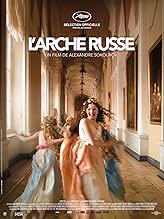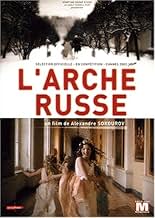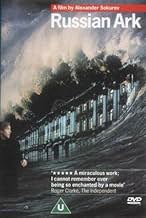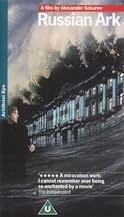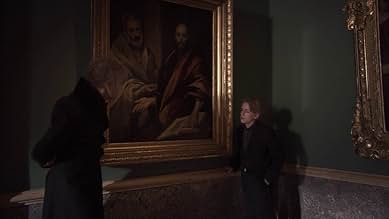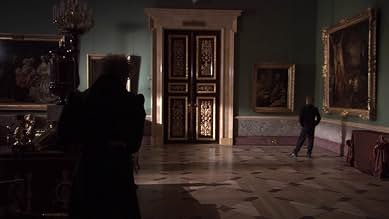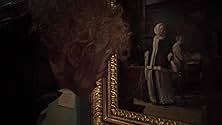Un aristocratico francese del 19° secolo, noto per i suoi testi sulla vita in Russia, attraversa il museo dell'Ermitage di San Pietroburgo e incontra personaggi storici degli ultimi 200 anni... Leggi tuttoUn aristocratico francese del 19° secolo, noto per i suoi testi sulla vita in Russia, attraversa il museo dell'Ermitage di San Pietroburgo e incontra personaggi storici degli ultimi 200 anni.Un aristocratico francese del 19° secolo, noto per i suoi testi sulla vita in Russia, attraversa il museo dell'Ermitage di San Pietroburgo e incontra personaggi storici degli ultimi 200 anni.
- Regia
- Sceneggiatura
- Star
- Premi
- 10 vittorie e 15 candidature totali
Recensioni in evidenza
Not knowing a lot of Russian history, some of the scenes didn't make much sense, but I did cotton on to Anastasia being late for tea. Maybe she got away after all. There was nothing from the Soviet era, except a brief scene during the German siege of Lenningrad (a million died, mainly from starvation, and many made coffins for themselves before they expired). This seems appropriate, since the communists contributed nothing to the buildings, which were started by Peter the Great and added to by his successors. A bad fire in 1837 was followed by extensive reconstruction and many of the rooms we see in the film date from that time.
I suppose this is the first film in which the set is the star and the actors merely props. There is in fact one dramatic part, that of the French Marquis who attended the Tsar's court in the 1840s, and who is somehow able to take us backward and forward in time. Even he is a bit two-dimensional, in fact the other, unseen, presence (the voice of the director of the film) is as real.
Towards the end we attend a great ball, and the Marquis gets to dance the Marzurka again. The music is great (is that Glinka conducting something of this own?) and the atmosphere gay (as somebody says `you can't be shy for the Mazurka') and for a moment history is forgotten. But we don't have a plot, the characters are cut-outs (with the exception of Catherine who seems to have been one of the more boisterous Empresses in history) and, basically, nothing happens. Yet I found myself absorbed by it all, occasionally wishing I could click my mouse to zoom in on an interesting painting. Ironically, much of the art is non-Russian, so `Russian Ark' is something of a misnomer `Euro-Ark' is nearer the mark. At the end of the day, though, I am lost with admiration for the cinematographer, who managed to keep his digital camera running and pointed in the right direction for 90 minutes without making a mistake. Madness, brilliant Russian madness.
Director Aleksandr Sokurov is the voice of the anonymous inquisitor who accompanies nineteenth century French marquis Sergei Dreiden (Sergei Dontsov) on a breathtaking tour of the physical and spiritual Hermitage of St. Petersburg. He has made a groundbreaking, stunning film. Shot from a Steadycam in one continuous over hour-and-a-half stream, the film explores the treasures of one of the world's greatest museums. Equally, "Russian Ark" rambles, without regard for chronological order, through snatches of Russian and Soviet history, each short episode a fantastical peep into a wild, rich, often terrifying but always fascinating world.
In the nineteenth century European travellers, most often men (Charles Dickens, for example) and some women (Fanny Trollope for one) visited and wrote about the two untamed civilizations that beckoned to foreigners and promised adventure and intrigue: Russia and the United States. Count Dreiden, a not atypical Frenchman of haughty self-assurance and ample means, viewed Russians as boorish and their culture a gilt-splendored front for a nearly barbarous land. His book would not have been picked up by a publisher linked to the travel industry.
In "Russian Ark" Dreiden is more muted than he is in print but his unquestioning cynicism comes through as Sokurov captures the imagined journey in one building of a French nobleman through both his time and a future he questions without developing much understanding.
So we have both an Acoustaguide tour of a wonderful palace of culture and myriad treasures and snapshots of everyone from Catherine the Great to Nicholas and Alexandra and their children, including an adorable Anastasia, fated to be one of history's silly mysteries. Noblemen and contemporary sailors, bemedaled officers and bejeweled women, a cultured woman gallery guide and apparatchiks - they all fleet through and interact with the questioning but stolidly biased Frenchman.
How did Sokurov pull off a continuous take through over 4,200 feet of the Hermitage with a cast of many hundreds, gorgeously costumed, without a hitch? Unbelievable! That feat alone propels him into the Cinema Pantheon of Fame. At times I felt like I was drawn into the crowd, especially when they depart a dance to head for a fabulous banquet (the dance band is conducted by Valery Gergiev, the only famous - to Westerners - person in the film). And even though I knew from reviews that Sokurov pulled it off, I kept waiting for the seemingly inevitable "Cut!" following a miscue or stumble.
The hint of intrigue and menace that is so much part of Russia's past and present lurks behind an almost impressionistic front with scenes of one-dimensional gaiety almost but not entirely hiding a complex society. Sokurov teaches and teases simultaneously.
As visual splendor and directorial innovation this is one of the great films of our time. I look forward to owning it on DVD knowing that its magic can never be realized fully outside a theater.
Don't miss this one and see it more than once.
10/10.
Russian Ark portrays the Hermitage as a kind of cultural and historical ark floating on centuries of Russian seas. The narrative device is a shadowy eighteenth century Frenchman who wanders the halls and time periods, commenting often with good-natured European condescension on what he sees. He is accompanied by a Russian who is never seen, and who questions him about his comments. The movie ranges through time with appearances of Peter the Great, Catherine II, Pushkin, Nicholas II and his family, generals, maids, flunkies and diplomats. The Frenchman, played with great style by Russian actor Sergei Dreiden, takes us to painting and sculpture galleries, kitchens, ballrooms, storerooms, basements and living quarters as we observe things that happened in the Hermitage over the centuries.
At first, I was very aware of the technical feat of no cuts. Gradually, though, I think most people just relax and accept the skill of the director and photographer, and become immersed in what they are seeing. A kind of unreal imagery takes hold. The movie ends with the last dance held in the Great Ballroom before WWI. Hundreds of actors and dancers, in full costume, swirl around this ornate setting, and swirl around the camera as well, while the camera glides through the crowds. It's a terrific scene, and is followed by the end of the dance with all the hundreds of guests making their way through the halls and staircases to leave the building, with the camera facing them and moving along in front of them.
This is a highly unusual film, probably a great one.
The film was obviously shot in one day, but the cast and crew rehearsed for months to time their movements precisely with the flow of the camera while capturing the complex narrative, with elaborate costumes from different periods, and several trips out to the exterior of the museum. Tillman Buttner, the director of photography, was responsible for capturing it all in one single Steadicam shot. "Russian Ark" is an amazing accomplishment, and clearly made with passion, but while the film is sure to be hailed as a masterpiece by some, its narrative conceit isn't nearly as interesting as the technical feat of its creation. The result is a unique and intelligent film with sporadic moments of transcendent beauty that fails to create a strong emotional connection with its audience. It's essentially a 96-minute museum tour, with the added benefit of time travel and wax figures that briefly come to life.
But wax figures are all they are, essentially. Sokurov, as though following a hasty guide, spends so little time with the historical figures he portrays that it often feels as though he's moving on just as you begin to figure out who and what you're watching. The Russian experience of World War II, for example, is portrayed with a brief stop in a foreboding, ghostly room filled with coffins. The filmmaker is known for his lugubrious pacing, but Russian Ark has the odd distinction of seeming both slow paced and rushed. It moves slowly and mournfully, but still only glances across the surface of the eras it portrays. It's a demanding film, encompassing a wealth of Russian history and art history between its first and final frames. Those who stay with it will be rewarded in the end by a gorgeously mounted ball, in which the camera gracefully slides among elaborately costumed dancers as the orchestra plays. It's a deeply felt irony that this transcendent moment of joy takes place on the eve of the Russian revolution, and the world of these briefly glimpsed characters is about to come crashing to an end. It's a shame that the film has few moments where form and content align so powerfully
For their bravura, awe-inspiring cinematic tour-de-force, director Alexander Sokurov and cinematographer Tilman Buttner take us into the famed Hermitage Museum and Winter Palace in St. Petersburg, providing us with a grand tour not only of the opulent rooms and famous artwork contained therein, but of 300 years of Russian history as well, as various vignettes involving famous people (from Peter and Catherine the Great to Nicholas and Alexandra) and events are played out within the glorious gilded walls.
`Russian Ark' is a bold and audacious project that is the cinematic equivalent of a breathlessly performed high wire juggling act. We know that one false move on the part of the actors or the cameraman, one missed cue or accident of fate could bring the whole delicately poised enterprise crashing down around them. How often, one wonders, did a perfectionist like Sukorov have to resist the temptation to yell `Cut!' to his actors and crew? It's truly amazing to see just how beautifully planned and flawlessly executed the final product turns out to be, especially the ball sequence at the end which features hundreds of dancers and spectators who are set in beautifully choreographed and constantly whirling motion. What's most remarkable is how much of a participant the camera itself is in the proceedings. Not content to stand idly by and observe the scene like some passive onlooker, the camera moves right into the center of the action, gliding in and out of the crowds with utmost grace and precision. Visually, the film is stunning, with exquisite costumes and furnishings as far as the eye can see. Indeed, `Russian Ark' is, among other things, a veritable feast for the eyes, the likes of which we have rarely seen on film before.
`Russian Ark' does have something of a `plot,' involving a narrator whom we never see, a 21st Century filmmaker we assume it's Sukorov himself - who's found himself inexplicably caught in some type of time warp and magically transported to this strange spectral world. There's also a bizarre European `ghost' figure from the unspecified past who comments - and occasionally attempts to intrude on the actions taking place around him. But these two characters are of far less interest to the audience than the aural and visual delights of the film itself.
`Russian Ark' is a wonder to behold, for it is much more than just an `exercise,' a `gimmick,' or even an `antithesis' to Eisenstein; it is a vibrant work of art that challenges the limits of its medium and reminds us of just what it is about movies that we love so much.
Lo sapevi?
- QuizShot in a single take. The first three attempts were cut short by technical difficulties, but the fourth was successful.
- BlooperMany extras look to the camera and they quickly return to a default mark.
- Citazioni
The Time Traveller: Sir. Sir. A pity you're not here with me. You would understand everything. Look. The sea is all around. And we are destined to sail forever, to live forever.
- ConnessioniEdited into Spisok korabley (2008)
- Colonne sonoreMazurka
(from opera "A Life For The Tsar")
Music by Mikhail Glinka
Performed by Mariinsky Theatre Orchestra
Conducted by Valery Gergiev
I più visti
- How long is Russian Ark?Powered by Alexa
Dettagli
- Data di uscita
- Paesi di origine
- Lingue
- Celebre anche come
- Russian Ark
- Luoghi delle riprese
- Aziende produttrici
- Vedi altri crediti dell’azienda su IMDbPro
Botteghino
- Lordo Stati Uniti e Canada
- 3.048.997 USD
- Fine settimana di apertura Stati Uniti e Canada
- 29.022 USD
- 15 dic 2002
- Lordo in tutto il mondo
- 8.691.860 USD
- Tempo di esecuzione1 ora 39 minuti
- Colore
- Mix di suoni
- Proporzioni
- 1.78 : 1
Contribuisci a questa pagina







